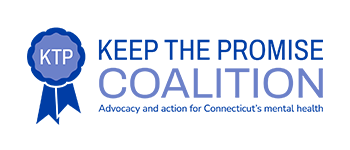By Jordan Fairchild

Image by KC Green. A comic strip, showing a brown dog sat at a table, with a coffee mug in a green room lit on fire. The ceiling is filled with smoke. The second panel shows the dog speaking, in a text bubble “This is fine.”
Articles published on this blog reflect the opinions of the authors, and not Keep The Promise Coalition or its membership as a whole.
It’s an election year and yet again, corporate mental health websites are publishing blogs about shutting out distressing news for the sake of our sanity. These blogs offer tips on how to support our mental health amidst a world which is on fire (definitely my wording, not theirs).
These articles from major mental health institutions will tout the virtues of turning off and tuning out—”yes, make sure to vote, but don’t pay too much attention to the news if it’s causing you distress.” Instead, they offer an escape: “have you heard about our mental health app? We just published an election mental health toolkit” and “See your therapist! Perhaps we can find you the right diagnosis to prescribe these fears away. By the way—have you practiced mindfulness recently?”
But I’m not sold on the idea that tuning it all out is the right answer. Between the both major US parties support for Israel’s genocide of the Palestinian people, as well as our politicians’ routine targeting of trans people and reproductive healthcare, and the outright refusals by our government to address police violence against Black and brown people, the housing crisis, environmental destruction and more, it is true that I, like many others, have been experiencing extreme distress stemming from the world around me. As marginalized and oppressed people, watching the state-sponsored and often state-enacted destruction of our own lives as well as others’ is extremely maddening.
Bearing witness to these events is a radicalizing experience because of the fact that it is painful. Seeking to eliminate this distress only distances us from the targets of this oppression, and from our humanity, which drives us to act in solidarity with other oppressed people.
Psychiatry wants you to not pay attention
I have concerns about these types of messages, which are brought to us mainly by the industrial complexes of both for- and non-profit mental health, pharmaceutical, and software companies. Shouldn’t we all be going Mad from the state of the world? In spreading their message of tuning out and turning off, psychiatric institutions veil their own troubled history from public view. In the 1960s, for example, the white authors of the DSM-II did just this when re-writing the diagnostic criteria for schizophrenia to include “anger” and “hostility”—they had done so in a racist reaction to the civil rights and Black power movements, embracing white supremacist narratives about violent protests and creating a diagnostic tool used to silence and marginalize Black people involved in the struggle for liberation. In doing so, the authors of the DSM at the APA wholly obscured and pathologized the fears, anger, and actions of Black revolutionaries, leading to racially disparate rates of psychiatric incarcerations and diagnoses of so-called “psychotic disorders” today.
Mental health institutions also profit from this type of distress, and seek political opportunities to market their services. This August, BetterHelp, an Israeli mental health app, published an article on its website about mental health during an election year. The article pathologizes this type of distress as “election stress disorder” while promoting the carceral 988 mental health hotline. The authors advocate for limiting social media exposure to news and politics, and of course, market BetterHelp’s services as a solution. Of course, besides the obvious attempt to profit off of the election and this distress, it stands to reason that BetterHelp would recommend limiting social media exposure, given that Israel’s genocide of the Palestinians is one of the most prevalent issues being discussed on social media this election cycle, and that BetterHelp itself is a Zionist corporation.
Consistent with psychiatry’s advice to shelter ourselves from distressing news, social media platforms such as Facebook and Instagram have already integrated features to automatically suppress the visibility of content which is deemed political, including those featuring news coverage, images, or testimonials of Israel’s genocide.
*I would be remiss if I didn’t also mention Teva’s (an Israeli drug manufacturer) use of incarcerated Palestinians as pharmaceutical test subjects. Campaign for Psych Abolition writes about both of these companies in more detail in their zine, Psychiatry’s Role in the Occupation of Palestine.
In addition to these forms of oppression, it’s impossible for me as a trans woman to ignore psychiatry’s legacy of pathologizing queerness. My healthcare is still gatekept today by psychiatric authorities and a diagnostic label written into the DSM—something discussed extensively in Julia Serano’s Whipping Girl. Proponents of the past four years’ legislative attacks on trans lives have embraced psychiatry’s language, often referring to transness as a mental illness, and promoting conversion therapy as a replacement for gender affirming care. Some of us cannot afford to look away.
This type of encouraged disengagement using mental health language distances us from our humanity. It protects systems of oppression, and isolates us from our communities, thereby removing community-led forms of healing and justice as the natural progression of our disillusionment with the ruling class and dominant social paradigms. Anyone with a heart would go mad from observing these acts of oppression, and psychiatry cannot offer a way out which does not serve to prevent this type of disillusionment with our political system and the narratives of the dominant culture.
There’s privilege in tuning out
Due to the APA’s decision to pathologize Black and brown people’s struggle for liberation in the 1960s, Black people are still about 4x more likely to be diagnosed with ‘psychotic disorders’ today. Notably, these types of diagnoses of “serious mental illness (SMI)” (whatever that means) can be used to oppress those who are diagnosed, especially when compared to diagnoses such as depression, which Black folks are less likely to be diagnosed with their white counterparts. Diagnoses of SMI are therefore used to disproportionately oppress Black and brown people, while depression as a diagnosis is more often attributed to white people, who stand to lose less by following ‘therapeutic’ advice to disengage from the horrors unfolding in the world around them—especially those who are not affected by these horrors. In this way, simply tuning out from distressing news to protect one’s mental health is a privilege.
Embracing Madness as a political force
What can we do then, about our distress while the world around us is on fire? Perhaps this is the wrong question. Very little of the existing writing on the distressing effects of our political process bothers to ask whether that distress is necessary in the first place.
Instead of turning away from distressing news and realities, I propose we face them head on. We might explore the ways in which we may channel our distress, anger, and Madness at the state of the world and the ruling class, and use those feelings to dismantle the violent systems and narratives which oppress us. We might find community with which to practice harm reductive support and name feelings of anger and extreme distress with those who are divested from carceral mental health service systems. We might explore these feelings to understand their systemic roots, and let our madness from witnessing this oppression radicalize us. We might attend teach-ins, and learn how to organize within our local communities to raise funds for mutual aid, create alternatives to institutional models of support, and fight back against oppressive systems. By embracing our Madness and righteous distress, grief, and anger at these injustices, we might begin to dismantle the systems responsible for our oppression.
Jordan Fairchild (she/her) is a Mad, queer and Trans, East Asian artist, organizer, and the Executive Director of Keep The Promise Coalition.

